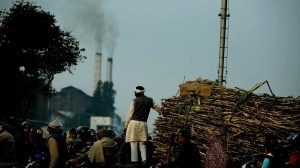- India
- International
In Chhattisgarh’s Bastar, a front similar to Salwa Judum is taking shape
A decade after Mahendra Karma launched Salwa Judum, the slain Congress leader’s son Chhavindra is trying to start another movement against Maoists in Chhattisgarh.
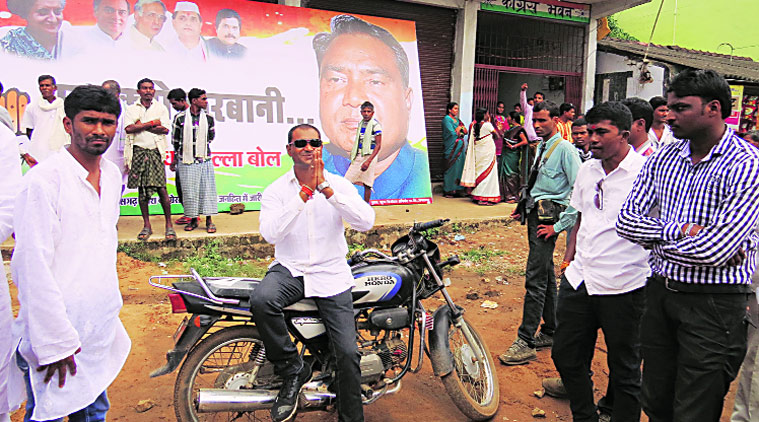 ‘Including my papa, 95 of my family have been killed. I carry the family responsibility of freeing this area from Naxals,’ says Chhavindra. (Source: Express Photo by Ashutosh Bhardwaj)
‘Including my papa, 95 of my family have been killed. I carry the family responsibility of freeing this area from Naxals,’ says Chhavindra. (Source: Express Photo by Ashutosh Bhardwaj)
A decade after Mahendra Karma launched Salma Judum, the slain Congress leader’s son Chhavindra is trying to start another movement against Maoists in Chhattisgarh, looking for police and government support and raising fears of a rerun of the violence. Ashutosh Bhardwaj reports from Bastar
The coincidence is stark. Exactly a decade ago, on June 4, 2005, the Chhattisgarh government signed an MoU with the Tatas for a mega steel plant in Bastar, with Maoists being the only hurdle. The following day, Salwa Judum was launched to evict Maoists from the region, a move that went on to define the last decade of the insurgency.
Last month in Dantewada, in PM Narendra Modi’s presence, the Raman Singh government signed MoUs for an ultra mega steel plant and a rail line in Bastar. Meanwhile, a front similar to Salwa Judum has been taking shape. The earlier movement was led by the late Mahendra Karma; the new one, called Vikas Sangharsh Samiti, is headed by his son Chhavindra.
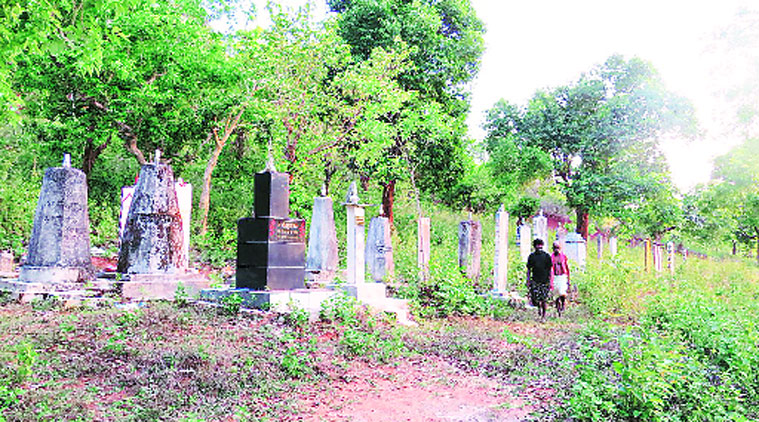 Memorials to members of the Karma family at Faraspal. (Source: Express photo by Ashutosh Bhardwaj)
Memorials to members of the Karma family at Faraspal. (Source: Express photo by Ashutosh Bhardwaj)
The beginning of the Samiti too sounds eerily familiar. In 2005, Karma began padyatras across South Bastar urging tribals to come out of their villages and live in camps for a decisive battle against the Maoists. Now, Chhavindra plans similar campaigns with former Judum commanders. He has sought government support and police protection, and said he is ready for any “qurbani”.
The possibility of what this will lead to chills many people. In the 30 months of Salwa Judum before it fizzled out in 2007, Chhattisgarh saw the deaths of 325 security personnel, 609 civilians and 165 suspected Maoists. That’s 1,099 deaths, or a death a day; Judum leaders say the number is far higher.

A little away from the Faraspal home of Karma stand a series of monuments built in the memory of his relatives. Near the home is Karma’s statute with folded hands.
“Including my papa, 95 people of my family have been killed in this battle. They say I am doing raajniti. I carry the family responsibility of freeing this area from Naxals,” says Chhavindra, 34. He insists there won’t be any violence this time, but with police already declaring support, he knows what he’s preparing for. “Is ladai men qurbaniyan deni hi padengi (this war won’t be won without sacrifice). Let the first bullet hit my chest.”
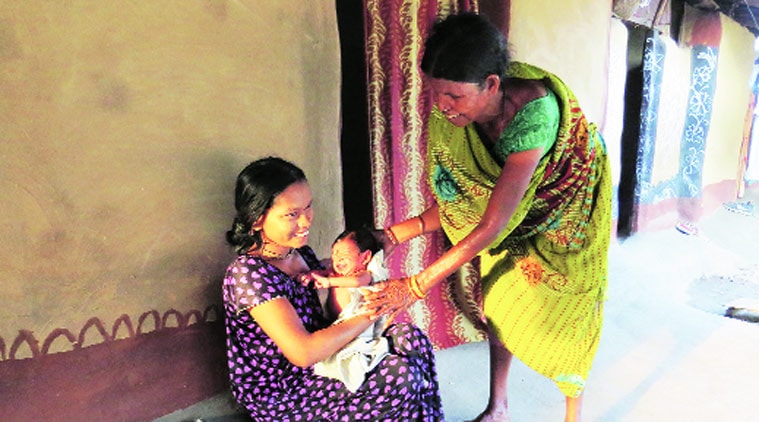 Vetti Meena with her newborn in a camp in Dornapal — wife of an SPO, she grieves that they can never leave. (Source: Express photo by Ashutosh Bhardwaj)
Vetti Meena with her newborn in a camp in Dornapal — wife of an SPO, she grieves that they can never leave. (Source: Express photo by Ashutosh Bhardwaj)
As of now, Chhavindra or the new front has little popular support or military strength. It hopes the government support will turn things its way. The plan is to go on padyatras and tell villagers to stop supporting Maoists — just like Karma had done once.
Remains of Salwa Judum
At its peak, Judum had around 100 major leaders. Just around 15 are alive today.
Mahendra Karma had three chief lieutenants heading a district each — Soyam Muka in Sukma, Chaitram Attami in Dantewada and Mahadev Rana in Bijapur. Rana was killed. Attami, uprooted from his village a decade ago, lives in a Salwa Judum camp, while Muka, also uprooted, says he has lost more relatives than anyone else. “You will find maximum Soyams in the list of the killed,” he adds, as he mentions his deceased elder brother Soyam Mukesh.
A primary teacher, Muka had picked up the gun at the call of his mama, Karma. Chhavindra wants him to join the new movement, but Muka says, “After Karma’s death, I lost faith. When he was alive I thought if he could defeat death, so could I.”
Another Judum leader, Sattar Ali, was in Karma’s vehicle when Maoists attacked the Congress convoy in May 2013. “When the Maoists opened fire, Karmaji came out. He offered his life and saved all of us.”
Chhavindra, who accompanied his father during the Judum campaigns, is banking on his father’s stature. “When Salwa Judum was on, whose statements were published? The CM’s? No, it was Karmaji’s,” he says.
During the assembly election campaign for their mother Devti, Karma’s sons had accused Raman Singh of betraying their father. “It was a mistake to have taken the support of the government during Salwa Judum. Raman Singh withdrew later,” they had said. Of late, Chhavindra has been making public calls for government support again.
The government imprint
Dantewada stands at the confluence of rivers Dankini and Shankhi, names with diametrically opposite meanings. Dankini means a sting, Shankhi the holy conch. Led by a Congress leader, supported by the BJP government, Salwa Judum too had dichotomy as an intrinsic part.
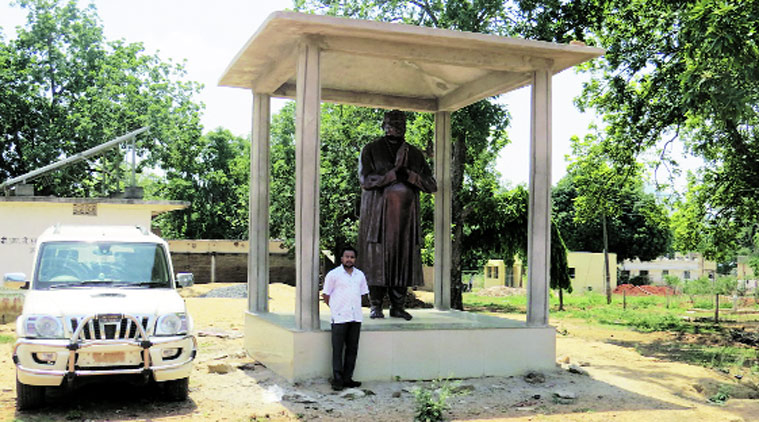 Eldest son Deepak stands beside Mahendra Karma’s statue. (Source: Express photo by Ashutosh Bhardwaj)
Eldest son Deepak stands beside Mahendra Karma’s statue. (Source: Express photo by Ashutosh Bhardwaj)
That continues. Dantewada BJP zilla panchayat member Chaitram Attami was on stage when Chhavindra, a Congress secretary, and others announced the formation of the new Samiti. Days later, Attami was overseeing laying of a helipad in Dantewada for PM Modi to land on.
Attami had controlled Judum operations in Dantewada the last time too, earning Z category security. Guarded by 16 cops, he lives with his wife and a baby in a camp at Kasauli.
Speaking at Karma’s death anniversary last month, Bastar IGP S R Kalluri declared his support for the Samiti. “The national media has misrepresented Vikas Sangharsh Samiti and wrongly compared it with Salwa Judum so that someone gets a chance to go to the court against it,” he said. Kalluri asserted Salwa Judum was not properly defended in court, and should anyone challenge the legality of the new front, he will defend it.
Chief Minister Raman Singh believed that “Salwa Judum was a people’s movement, a jan andolan.” He hinted at government support to the front: “On the issue of garnering consent among people, making them ready and creating a certain atmosphere — there should be awareness. If we stand up against Naxals on the streets and bring villagers along, I have to ensure they are protected.”
The state Congress has rejected the new campaign. “The Supreme Court banned special police officers. The Congress distances itself from this venture,” says PCC chief Bhupesh Baghel.
The forgotten camps
Across the road from Bastar’s first fortified police station, in Dornapal of Sukma, is the largest Salwa Judum camp. It once had over 25,000 uprooted tribals from 72 villages.
Tiny huts crowd narrow lanes. A wistful Janaki Kawasi, 32, rushes closer. “Have you been to Jagargunda? My village Milampalli is not far from there. How is it now?” she says. Then, her voice drops. “I know, nothing can be left now. It’s all deserted.”
Since she came here in 2007 with her husband, she has become a zilla panchayat member from the BJP. Yet she longs for home. “What’s here? Everything got left there.”
Over two dozen such camps came up in South Bastar as around one lakh tribals left their villages, not all of them by choice.
Most Judum camps came up along highways or roads, but the heavily fortified one in Jagargunda is in the wilderness. It houses over 4,000, who wanted to stay closer home and ended up vulnerable. Janaki’s father-in-law Kawasi Hadma was among those who stayed back. He was killed last November.
Vetti Meena recently gave birth to a son in the Dornapal camp and grieves that he is confined. Her husband was an SPO and is now posted 50 km away. She resigns herself to fate: “Policewale kabhi nahin laut payenge. Yahin marna hai ab (Policemen won’t ever be able to go back. We will die here.”
There are 184 families still at the camp where Attami stays, at least 100 of SPOs. The government has stopped providing rations. Guarded by police, they live in constant fear of attack. Maoists had attacked a Salwa Judum camp in July 2006 in Errabore, leaving 32 dead, including two babies. They had also abducted 42 and publicly executed six.
In the 2013 polls, which Karma’s wife Devti contested, his sons promised to ensure the return home of camp inmates. Eldest son Deepak calls the conditions in the camps Judum’s biggest failure. “Tribal girls faced the worst sexual harassment by security forces,” he says.
“How could my father have checked or foreseen that? It was the task of the government to run these camps. But the government stopped giving them even rations.”
The renewed fear
Salwa Judum had effectively given the Maoists a boost. Though present in Bastar for over two decades, they had limited dominance or military capacity. As Judum leaders pushed villagers out of their homes, the SPOs were accused of torture. At least 5,000 locals joined the Maoist ranks during those months. From small dalams, Maoists graduated to platoons, companies and battalions.
Kichhe Nanda is among the SPOs facing rape charges. He denies that at first, then lashes out bitterly, “We were young, given rifles, and told to hunt for Naxals.” There were “atrocities” from the other side too, he says.
Editor of daily Bastar Impact Suresh Mahapatra recalls the Rani Bodli attack of March 2007, when 55 policemen and SPOs were killed. “This incident was the defining point in my life. When I saw half-burnt and beheaded bodies, it occurred to me that this war had no rules now,” he says.
Attami, among the earliest SPOs to sign up, says: “You talk about police atrocities, but do you know what the Naxals did? Agar beta ko maarna hai to maa aur baap ko us par patthar marne ko bolte the (If they wanted to kill someone, they forced his parents to throw stones at him).” Accusing the Maoists of dragging them into battle, Attami adds, “They had a grudge against capitalists. Why didn’t they kill them themselves? We tribals knew nothing about the world, but they made us fight their battles. Is it janvaad?”
Sukhdev Tati reflects they were left with little choice: either become Maoists or fight with police. “We wanted it to be peaceful, but Salwa Judum had aggression. It failed as we could not tell people what our aim was.”
However, many of the tribals have no enmity towards the Maoists. “Adivasi log hi to mar rahe hain. Yahan bhi adivasi, wahan bhi,” says Janaki. Teacher Mandavi says it emphatically. “They (Maoists) are our own people. We don’t want this violence.”
“Once again the terror and oppression of Salwa Judum is going to start. Bastar could be protected only if this campaign is defeated,” said a recent Maoist statement urging people “to rise against the proposed Salwa Judum-2”.
Where they are now: Key survivors from Salwa Judum
Soyam Muka: Congress member, lives in Konta away from his Gaganpalli village he left during Judum. Farming. Moves without vehicle.
Karma family: Mahendra Karma’s wife Devti Karma is a Congress MLA, two of her four sons hold positions in the Congress.
Chaitram Attami: Dantewada BJP zilla panchayat member, uprooted from his village, lives in a Salwa Judum camp in Kasauli, Dantewada.
Sukhdev Tati: BJP member, farmer in Dantewada.
Sattar Ali: Contractor, runs trucks, lives in Jagdalpur.
Vikram Mandavi: Congress member, contested 2013 assembly polls from Bijapur.
Apr 25: Latest News
- 01
- 02
- 03
- 04
- 05
















